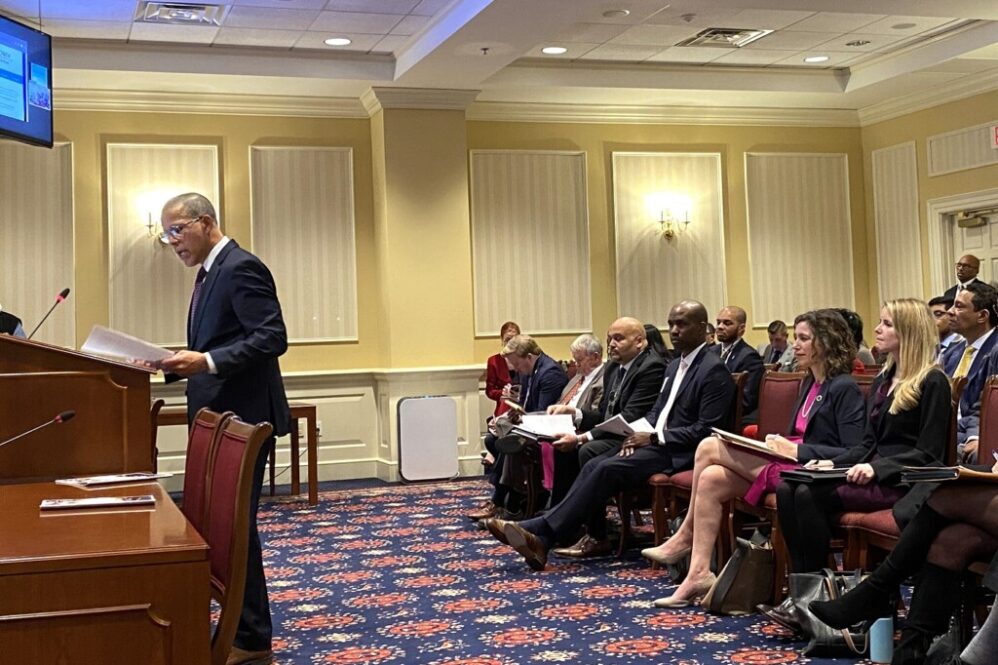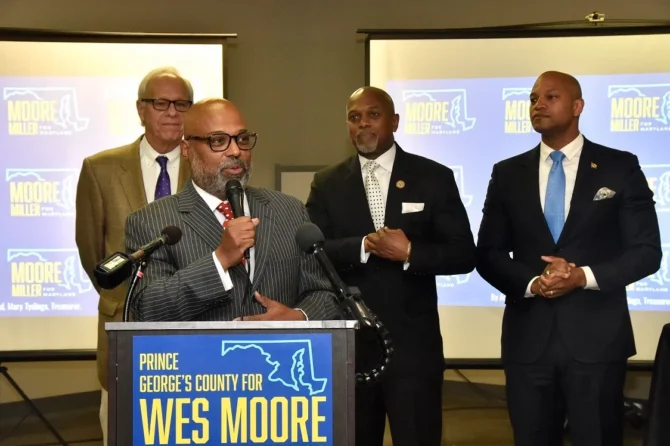MARYLAND MATTERS: Maryland Attorney General Anthony Brown (D) testified Tuesday in favor of legislation that would give his office’s Independent Investigations Division prosecutorial power.
Brown, sworn in as the state’s top prosecutor Jan. 3, was testifying in Annapolis for the first time as attorney general. He inherited the investigations division, which was created two years ago to review police interactions that result in the death, or injuries likely to result in death, of a civilian.
The proposed legislation, sponsored by Judicial Proceedings Committee Chair William C. Smith Jr. (D-Montgomery), would repeal a requirement that the attorney general’s investigative division report findings in police-involved deaths to the local state’s attorney, who would decide whether to prosecute. Instead the legislation would give the attorney general the exclusive right to prosecute, unless the attorney general requests that the state’s attorney do so.
The bill also would require the AG’s Independent Investigations Division to investigate police-involved death or injuries not only to a “civilian” but to any “individual.”
The proposal would also give the division authority to investigate any crime related to police misconduct that is discovered during such an investigation. It also would allow a state’s attorney to refer a police-involved incident resulting in injury to the AG’s division for investigation and would allow the attorney general, based on findings, to prosecute.
“This is a division with a high degree of experience and expertise in this specialized work,” Brown said during a 3 1/2-hour bill hearing before the Judicial Proceedings Committee. “They have conducted over 25 investigations with the expertise, the ethics and the fairness that you intended, and that the public deserves.”
Smith agreed.
“I think this bill will round out and finalize our much needed and important reforms…and will be more transparent. It will be more responsive to our citizen’s needs,” said Smith, chair of the committee. “The citizens of Maryland called for just this type of transparency and accountability and accessibility…and ensures that that information is accessible to every American and will ultimately make the bridge the divide between the police.”
Some state’s attorneys and law enforcement officials said the legislation would take away authority from local prosecutors in Maryland’s 24 jurisdictions.
Wanda Keyes Heard, a retired Baltimore Circuit Court judge, said some lawyers in the attorney general’s investigation unit don’t have as much as experience as local prosecutors, especially when it comes to handling criminal cases.
“If this bill is passed, it will place charging decisions and the prosecution of certain very crucial cases in untrained hands,” Heard said. “I’m saying untrained hands, not because they’re not the best in the civil department, not because they’re not the best in criminal appeals and other complex cases that extend across the state of Maryland. They are like the giant law firm, [a] civil law firm for the state of Maryland. But you have an abundance of experienced prosecutors in jurisdictions around the state whose sole responsibility is to do criminal litigation.”
Another reason to leave such cases in the hands of state’s attorneys is that they, unlike employees of the Office of the Attorney General, are chosen by voters in local elections, opponents said.
“I’d like to point out that we have recently been elected and we have the public trust,” said Howard County State’s Attorney Rich Gibson Jr., also president of the Maryland State’s Attorney Association. “We have the hope of competence as evidenced by the fact that we’re here in positions. The attorney general is a statewide entity, [but it doesn’t] have the same control or access, or ability to effect change.”
However, Sen. Charles Syndor (D-Baltimore County) noted that voters chose Brown for his position. To amplify his point, he read a portion of the state constitution that states that the attorney general not only prosecutes and defends part of the state, but also can investigate, commence, and prosecute or defend any civil or criminal suit or action.”
“I’m trying to understand…why are you getting so up in arms about this?” he said to the prosecutors who don’t support the bill.
A House of Delegates version of the bill — sponsored by House Judiciary Committee Chair Luke Clippinger (D-Baltimore City), Ways and Means Chair Vanessa Atterbeary (D-Howard) and David Moon (D-Montgomery), the Judiciary Committee vice-chair — will be heard at a public hearing March 7.
Attorney General report
Meanwhile, some people attending the hearing read through the first report from the investigations division released in November by former Attorney General Brian Frosh (D), which covered 23 police-involved fatalities between Oct. 1, 2021 and Sept. 30, 2022.
The nearly 50-page report breaks down cases by age, gender and race of officers and persons who died, evidence used and month, day of the week and time the incidents occurred.
Twenty-one of the 23 people who died were men and 14 were Black, according to the document. Of the 45 officers involved in the incidents, 38 were white.
None of the cases were prosecuted by state’s attorneys.
The document highlighted how the attorney general’s office filed a suit against the Harford County Sheriff’s Office for not cooperating with an investigation after a deputy shot and killed a civilian on April 23. The report notes that months before the investigations division unit became established, the sheriff’s office “vowed to not follow” any protocols.
Although a Harford County judge ruled the sheriff’s office must release all evidence in the case, that county’s state’s attorney declined.
As of Tuesday, the statewide unit has begun investigations in 29 cases and completed 17, according to Dana Mulhauser, chief of the Independent Investigations Division.
Those who support the proposal expanding the division’s authority said it would help eliminate a conflict of interest between local prosecutors and law enforcement officials, who work together to solve and prosecute cases together.
“Few incidents challenge the integrity and legitimacy of this [legal] system more than the decision to prosecute or decline to charge a death involving a police officer based on those investigations,” said Heather Warnken, executive director at the Center for Criminal Justice Reform at the University of Baltimore School of Law. “This conflict of interest cast doubt not only on the capacity and effectiveness of local prosecutions of officers when needed and warranted, but it also undermines their credibility when those offices legitimately determine that a prosecution is unwanted.”











